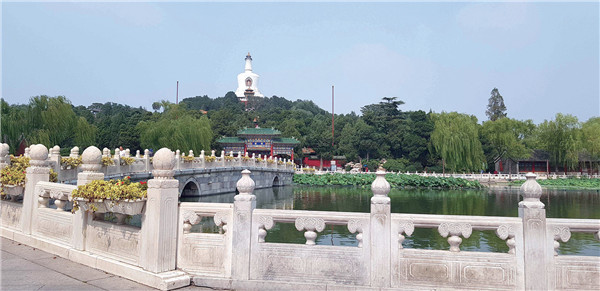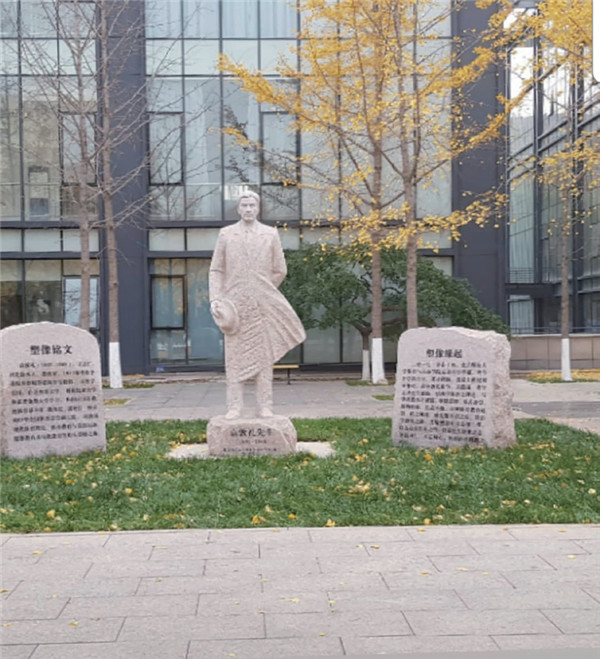中式恋爱
[瑞士] 莉娜 北京师范大学

从表面上看,中国人似乎与我们国家的人没有什么不同。但是当涉及人际交往和恋爱时,那就是我开始真正体验一些文化差异的时候。作为一个有过和中国人谈恋爱经历的欧洲人,我当然体验了很多所谓“文化震撼”。下面,我就给大家讲几个恋爱中的小故事,表达我感受到的中国文化对我的冲击。
“外面冷了,你多穿点儿衣服。”我立即想到我当时的男朋友会跟我说的担心我的这些小句子。例如:“外面很冷,注意保暖哦。”或者直接说:“乖哟。”与欧洲人谈恋爱相比,这是一个很大的差异。我们绝不会告诉任何人“吃点东西”或“乖”或“多穿点儿衣服”。我想如果我的同胞这样跟我说话,我会觉得他可能有点太霸道。我可能会想:“我是成年人,为什么要告诉我这些显而易见的事情呢?”我们十岁以后,甚至父母也不再说这些。但是在中国,这似乎是完全正常的,甚至是可以预期的。我也开始期待,甚至喜欢听到这些话。毕竟,谁不想被照顾呢?

与同学在张家界 / 莉娜提供

北海公园 / 莉娜提供
“我养你哟!”对我来说,另一个非常有趣的观点是在中国的恋爱关系中,男人似乎扮演着一种“保护角色”。比如,他在餐馆付款,在财务上提供资金来养他的女友,甚至在某种程度上关心她的父母。我当时的男朋友第一次问我父母最近怎么样时,我感到有点惊讶。“他们过得还好吧。”我喃喃自语。我其实并不经常跟他们联系,我不知道该说什么。然后他说:“圣诞节快到了,你快回家了。”他给了我一个大袋子,里面装满了礼物,送给我的父母和整个家庭。“你为我全家人买了礼物吗?”我充满惊讶。“没事,我养你哟,妞!”他微笑了。“这是送给咱妈的礼物。”“咱妈?什么咱们的妈妈,她是我的妈妈呀。”我说。“你知道我们结婚之后,”他说,“我叫你的妈妈‘咱妈’。”“婚姻?”我们当时才谈了一年的恋爱。“你打算结婚吗?”他问。我开始流汗,欲言又止。他说:“哎,不用担心,我爸妈已经买了房子。”“房子?!”我喊了出来。在我的国家,结婚是没有前提的。没有人需要房屋或汽车,父母通常不会催婚。在我们的生活中,婚姻不是一件必须在特定年龄或与特定人进行的事情。如果想结婚就结婚,如果从未想过结婚,那也可以。我认为这是一个很大的文化差异。我觉得中国人更注重家庭。在他们一生中的所有重要阶段,家人都会向他们提供帮助和支持。尽管父母们有时可能会住在一个“空巢”的家,但他们的孩子最终还是会回来。

北海公园 / 莉娜提供
“你在干吗呢,你在干吗呢,你在干什么呢?”我注意到的另一个文化差异是发送短信的频率。这应该也是因人而异,但总的来说,我想说的是,在我国,我们并不是经常发短信。但在中国,发短信的频率高了一点。有一次我收到一条短信说:“你在干吗呢?”但是由于我很忙,所以没有回复。两分钟后,我收到另一条短信,询问我在做什么。由于手机已静音,因此没看到。下课后我打开手机,一看到屏幕就很惊讶:我收到了五条短信和两个未接来电。在我的国家,谈恋爱不是我们生活的全部,而只是我们生活的一部分。我们通常会花一些时间,但是我们不会每天花很多时间一直考虑对象在做什么。另一点是,我们从不希望被视为“黏人”的或者过度依赖他人的那种人。因此,我们绝不会发太多短信或者回复得太快。否则,对象会认为你没有尊严。但是我不得不承认,我个人更喜欢中国人的方式,这样的爱情真甜!

北京师范大学 / 莉娜摄
“不好意思,我们的星座不配。”这一点我觉得很有趣。有一次我在一家餐馆遇到一个男生,我一坐下他就问我的星座是什么。我有点困惑。那重要吗?他跟我解释他跟他的前女友分手的原因是,他的父母说他们的星座不匹配。那时候我就不知道我是应该为父母对孩子谈恋爱的事情有发言权而感到惊讶,还是对星座如此重要而感到惊讶。但是我发现,在中国这并不是少见的现象,父母对子女谈恋爱的事情有一定的发言权。我想中国每个家庭父母对子女恋爱的干涉程度和亲子之间的亲密程度都不同,但如果子女决定结婚,父母可能都会发表意见。特别是在结婚后,父母可能会帮忙照顾新生儿,甚至经常来新婚夫妇的房子打扫。所有这些在我的国家都非常罕见。父母通常不会干预子女的恋爱或婚姻生活,更不用说计算生日日期或星座的匹配度了。这些传统和习惯让我感到困惑,也让我着迷。幸运的是,我不是四月四日出生的,否则可能没有中国男人会想要我。
总而言之,在中国恋爱肯定会受到文化冲击。我觉得作为人类,尽管有着相同的感受,但是在彼此相处中,我们还是会发现不同的表达方式。回顾过去,这些文化冲击常常是引起笑声的原因,甚至能使人际关系更加牢固。
Chinese-Style Love
[Switzerland] Lina Kohler, Beijing Normal University
Apparently, the Chinese people seem to be not different from the people in our country. But when it comes to interpersonal relationship and love, that’s when I start to really experience some cultural differences. As a European who had love experiences in China, I have certainly had a lot of so-called cultural “shock”. Next, I will tell you a few love anecdotes to express the impact of Chinese culture on me.
“It’s cold outside, put on more clothes.” I immediately think of these small sentences that my boyfriend at that time would tell me in concern. For example, “It’s cold outside, keep yourself warm,” or just say, “Good girl.” Compared with Europeans in love, this is a big difference. We will never tell anyone to “eat”, “be good” or “put on more clothes”. I think if my countrymen speak to me like this, I would think he might be a little too bossy. The addressed may think, “I’m an adult, so why are you telling me these obvious things?” After 10 years old, even parents stop talking to their children about this. But in China, this seems to be completely normal, even predictable. I also begin to look forward to this and even like to hear these words. After all, who doesn’t want to be taken care of?
“I’ll support you!” Another very interesting idea to me is that men seem to almost play a “protective role” in Chinese lovers’ relationships. For example, he pays in restaurants, provides financial funds to support his girlfriend, and even cares about her parents to some extent. I was a little surprised when my boyfriend asked about my parents for the first time. “They’re all right.” I muttered to myself. Since I didn’t really get in touch with them often, I didn’t know what to say. Then he said, “Christmas is coming, and you’re soon going home.” He gave me a big bag full of gifts for my parents and the whole family. “Did you buy presents for my family?” I was surprised. “It’s all right, I’ll support you, girl!” He smiled. “This is a gift for our mother.” “Mother? What do you mean our mother? She is my mother.” I said. “You know, after we get married,” he said. “I’ll call your mother ‘our mother’” “Married?” We had only been in love for a year at that time. “Are you going to get married?” he asked. I began to sweat and hesitated to speak. He said, “Oh, don’t worry, my parents have already bought a house.” “House?!” I shouted. In my country, there is no prerequisite for marriage. No one needs a house or a car, and parents usually don’t urge their children to get married. In our life, marriage is not something that must be done at a particular age or with a particular person. If you want to get married, get married, and if you never think about getting married, that’s fine. I think this is a big cultural difference. I think Chinese people pay more attention to family. At all important stages of their life, their family will provide them with help and support. Although parents may sometimes live in an “empty nest”, their children will come back eventually.
“What are you doing? What are you doing? What are you doing at all?” Another cultural difference I have noticed is the frequency of sending text messages. This should vary from person to person, but generally speaking, what I want to say is that we don’t often send text messages in our country. But in China, the frequency of texting is a little high. Once I got a message saying, “What are you doing?” I didn’t reply because I was very busy. Two minutes later, I received another text message asking what I was doing. Because the mobile phone had been muted, I didn’t see it. After class, I turned on my phone and was surprised to see on the screen: I received five text messages and two missed calls. In my country, love is not the whole of our life, but only a part. We usually spend some time, but definitely not a lot of time every day thinking about what our lover is doing. Another point is that we never want to be seen as “clingy” or over-dependent on someone. Therefore, we will never send too many text messages or reply very soon. Otherwise, your lover would think that you have no dignity. But I have to admit I personally prefer the Chinese way, for such love is really sweet!
“Sorry, our constellations don’t match.” I think this point is very interesting. Once I met a boy in a restaurant. As soon as I sat down, he asked me what my zodiac sign was. I was a little confused. Does it matter? He explained to me that the reason he broke up with his ex-girlfriend was that his parents said their zodiac signs didn’t match. At that time, I didn’t know whether I was surprised that parents had a say in their children’s relationships, or that zodiac signs were so important. But I have found that it is not an uncommon phenomenon in China that parents have a certain say in their children’s love affairs. I think parents in China differ in the degrees of interference with their children’s love and the degree of intimacy with their children. But if their children decide to get married, all parents may express their opinions. Especially after marriage, parents may help take care of the newborn and even often come to clean the house of the newlyweds. All of these are very rare in my country. Parents usually do not interfere with their children’s love or marriage life, let alone calculate the matchableness of dates of birthday or zodiac signs. These traditions and habits confuse me and fascinate me as well. Fortunately, I was not born on April 4, otherwise maybe no Chinese man would want me.
All in all, having a love affair in China is bound to be affected by culture shock. I think as human beings, although we have the same feelings, we still find different ways of expression when we get along with each other. In retrospect, these culture shocks are often causes of laughter, and perhaps they even make interpersonal relationships stronger.



